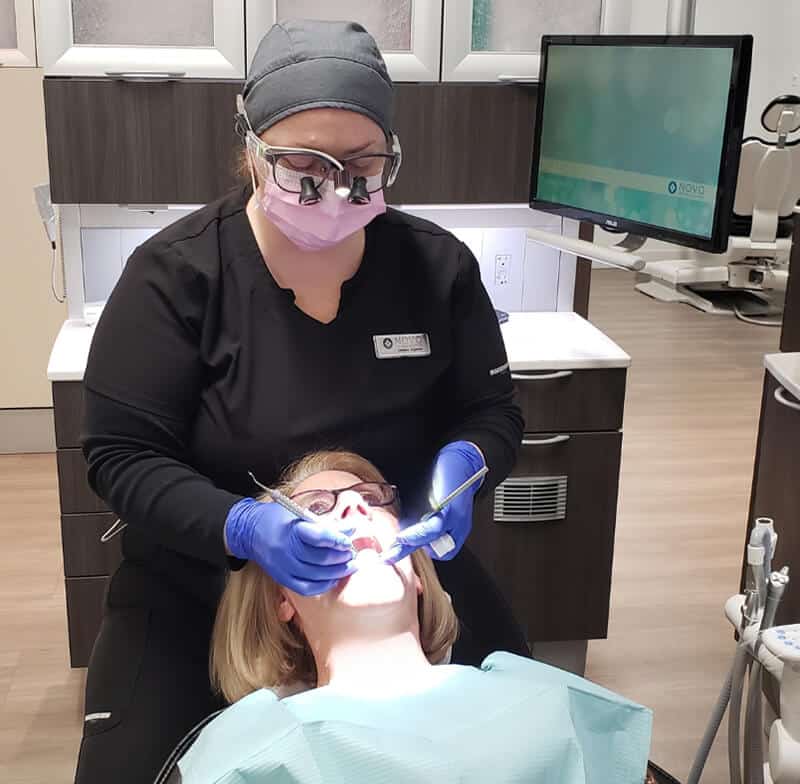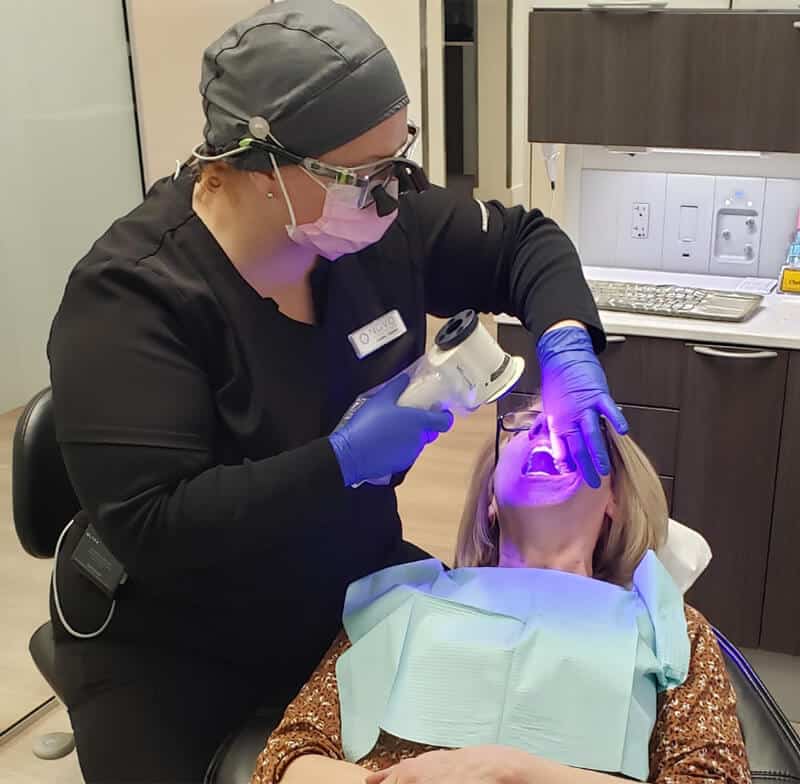Maintain Your Smile
Dental Hygiene Services:
Regular dental hygiene appointments are essential for maintaining a healthy oral environment and preventing dental problems such as gum disease, cavities, and tooth loss. During these appointments, your dental hygienist will work with you to assess the condition of your teeth and gums, educate you on proper oral hygiene techniques, and develop a personalized treatment plan to improve your oral health.
First Hygienist Appointment
At your first appointment, your hygienist will take measurements of your gum tissue and perform periodontal charting to establish a baseline of your gum health. These measurements are regularly updated to track any changes in your oral health over time.
Improve Your Health & Your Smile
To improve oral health, your hygienist will remove hardened plaque (tartar or calculus) from above and below the gumline, as well as soft deposits of bacterial plaque and food debris. This can be done using ultrasonic or water scalers and hand instruments. Your hygienist is committed to ensuring a comfortable experience and can address any sensitivity concerns you may have.
In addition to improving your gum health, dental hygiene appointments can also enhance the appearance of your teeth. External staining from substances such as coffee or tea can be removed through a polishing procedure, leaving you with a brighter, healthier smile.

Learn More About Dental Hygiene
At NOVO Dental Centre, our dental hygienists are dedicated to providing compassionate and thorough care to improve your oral and overall health. We believe that dental health is an integral part of overall health and are committed to helping you achieve optimal wellness.
Oral Cancer
Oral Cancer: Why Early Detection is Key
When you think of oral cancer you may picture an elderly person who smoked a pack of cigarettes a day since they were a teenager but, in recent years the incidences of oral and throat cancers have been increasing, particularly among young adults.
Oral cancer is a type of cancer that occurs in the tissues of the mouth, including the lips, gums, tongue,
roof and floor of the mouth, and inner lining of the cheeks. It often appears as a sore or growth in the
mouth that does not heal. If left untreated, it can spread to other parts of the body and become life-
threatening.
Early diagnosis and treatment increase survival rates:
Did you know that your dentist is in the best position to detect oral cancer?
It is important to remember that your dentist does not necessarily think you have cancer when they perform a screening test. Screening tests are given when you have no cancer symptoms. At your first visit to NOVO Dental Centre, your dentist will perform an oral cancer screening as part of your initial exam as this creates your individual baseline.
Oral Cancer Screening
The oral cancer screening exam involves 2 parts, a visual and a physical exam of the oral cavity and connected tissues. The exam is quick, painless and effective.
In the first part your dentist will inspect your face, neck, lips, inside of the nose and oral cavity looking for abnormalities. They will also feel your head and cheeks, around your jaw, under your chin and in your mouth to feel for unusual nodules or masses.

For the second part of the exam, your dentist will use a VELscope which is a medical device used to help detect oral cancer. It works by shining a special blue light (shows purple light in the photo) onto the tissues of the mouth, which causes them to fluoresce (glow) in different colours. Healthy tissue appears green, while abnormal tissue appears dark or black.
The VELscope helps detect oral cancer by highlighting areas of the mouth that may have abnormal tissue, which can then be further examined and potentially biopsied for diagnosis. Early detection of oral cancer is important because it can improve the chances of successful treatment and survival.
Should your dentist find an area of concern they will advise you on the best way to proceed, which may include a visit to your physician or specialist.
Annual Oral Cancer Screening
Annually your dentist and hygienist will perform oral cancer screenings as part of your preventative recare visits to ensure your optimal health.
Who’s at a Greater Risk for Oral Cancer?
People with:
- Significant sun exposure
- HPV
- Tobacco users
- Heavy alcohol drinkers
How to Perform a Monthly Oral Self-examination:
It’s important to learn to recognize the normal healthy condition of your own mouth so that you can detect abnormal conditions and report anything unusual to a dental professional or a medical specialist. Make it a regular routine to perform a self-exam each month.
Using a bright light and a mirror, follow these steps:
- Look at yourself in the mirror – both sides of your face and neck should look the same.
- Look at the skin on your neck and face for any changes in colour, moles that have changed, lumps or sores.
- Feel both sides of your neck gently with your fingertips to help detect lumps, bumps and sore spots.
- Gently place your finger over your “Adam’s Apple” and swallow. It should move up and down, not to the side. Report any hoarseness that doesn’t clear up within two weeks.
- Remove any dentures or appliances from your mouth.
- Check the inside of your mouth first by using a flashlight, then by putting the small mirror in your mouth, if you are able to do this.
- Check the roof of your mouth for changes in colour or lumps. With your index finger, gently press the roof of your mouth to feel for changes.
- Examine the floor of your mouth and feel it with your index finger. Remember, you are looking for colour changes, swelling and changes in shape, or anything that hurts when you touch it.
- With a piece of gauze between your finger and thumb, pull out your tongue and examine all sides – feel your tongue with your fingers.
- Look at your gums for colour change, lumps, bumps or tenderness. Report any sores that have not healed after 14 days.
- Pull your upper lip up and then your lower lip down and check. Gently squeeze your lips as well as your cheeks with your index finger and thumb to feel for lumps, bumps or tenderness. Report any pain, loss of feeling or any areas that bleed without cause.
- Gently run your index finger over your upper and lower gums.
What you are looking for?
The normal course of healing of any lump, bump or lesion is approximately two to three weeks. Anyone experiencing the following problems beyond this timeframe should consult a dental professional or seek medical attention:
- Red patches
- White patches
- Combination of red or white patches
- Tenderness or numbness in the mouth or lips
- A sore throat that does not go away
- A lump in the nose, neck, throat, mouth, gums or lips
- Trouble breathing, speaking chewing, swallowing or moving the tongue or jaw
- Ear pain
- A change in voice
Set Up An Oral Screening Appointment Today

Our clients agree that oral screenings are quick and painless, and they leave our office feeling great about their proactive decision.
Click here to schedule an oral cancer screening appointment today. If you’d like to learn more about the screening, please give us a call at 604-854-6162 or send an email to: info@novodentalcentre.com.


